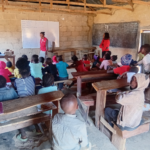The rise of remote work has revolutionised the global job market, offering individuals the flexibility to work from anywhere. Yet, for many Africans, entering this digital space has been challenging. Issues like unreliable internet, power outages, and geographical bias have often made it harder for African talent to gain access to global opportunities.
Stereotypes about the continent’s workforce, ranging from doubts about English proficiency to perceptions of low skill levels, have further complicated the journey for Africans seeking remote jobs.
Glory Eguabor, a visionary in the remote workspace, saw these challenges as opportunities to create change. She understood firsthand the struggle of navigating a global job market that seemed indifferent, or even hostile, to African talent. By 2018, after experiencing these barriers while freelancing from Benin-City, she recognised the need for a platform to bridge the gap between African professionals and global employers.
Her solution was Remote Tribe Africa: a digital ecosystem that empowers Africans with the skills and connections they need to thrive in the global digital economy. With a mission to help Africans “learn, connect, and grow,” Remote Tribe Africa quickly became a lifeline for many aspiring remote workers.
It was through this platform that Glory’s path crossed with a young woman struggling to find her place in the world. Destitute and dependent on an unsupportive relative, the woman found herself at a breaking point. One day, as she wept in church, Glory approached her—not with pity, but with an offer. “I have a training coming up,” Eguabor said. “Will you join the training? Because that’s how much I can vouch for the quality of what we do.” This simple act of kindness became the turning point in the lady’s life.
Within weeks, she had secured her first remote job, earning $800. It was a life-changing opportunity, one that opened doors to clients in Dubai and New Zealand. Soon, a client gifted her a laptop and even offered to sponsor her trip to Dubai. This transformation wasn’t just a stroke of luck; it was the product of the vision and determination behind Remote Tribe Africa.
A Mission Born of Experience
Glory’s journey into remote work began in 2018, when the concept was still foreign to many. Working remotely from Benin-City, she faced numerous obstacles, including geographical biases, outdated perceptions and even discrimination.
Clients frequently asked for proof of internet speed, backup power supplies, and assurances of her English proficiency, despite Nigeria being an English-speaking country. Glory’s resilience turned these setbacks into stepping stones, and by the time remote work became mainstream during the pandemic, she had carved out a successful niche for herself.
However, as she advanced in her career, Glory couldn’t help but notice that many talented Africans were still being left behind. This realisation inspired her to launch Remote Tribe Africa in March 2023. The platform quickly gained traction, attracting over 100 members in its first hour and expanding to eleven countries, including Uganda, Zimbabwe and Rwanda. It became a hub for aspiring remote workers to learn vital digital skills, make valuable connections, and grow professionally.
Remote Tribe Africa is not just a training platform; it is a comprehensive digital ecosystem. Through weekly sessions, the platform teaches its members everything from AI tools to personal branding. One of its flagship programs, the “Job Adventure Program,” is a 21-day intensive boot camp that has helped participants land remote jobs paying as much as $4,000 per month.
Glory’s approach is holistic, combining technical skills training with the necessary mindset shifts to help Africans view themselves as valuable global players. “Many Africans have a mindset problem when it comes to earning well or selling their value,” she notes. Her programs are designed to address both the skills gap and the mental barriers that hold many back from achieving success in the global job market.
Fighting Stereotypes and Bias
Remote Tribe Africa’s work is far from over. Despite its successes, the platform continues to challenge deep-seated stereotypes about African workers. “There’s this bias that makes people think that once you are from Africa, you likely can’t even speak English,” Glory observes. These biases often manifest in pay disparities, with Africans being paid significantly less than their Western counterparts for the same work. “The payment inequality is wrong. It’s 1,000 times wrong,” she says.
Through strategic partnerships with tech companies, Remote Tribe Africa has worked to address some of the practical barriers Africans face, such as unreliable internet and lack of access to modern devices. By offering affordable digital tools and better connectivity solutions, the platform is helping to level the playing field for African remote workers. “We want to tell a new story,” Eguabor asserts. “Africans are skilled, talented, and capable of leading in the global digital workforce.”
A Vision Rooted in Resilience
Born and raised in Lagos, Eguabor’s resilience was forged in a city known for its hustle. Her move to Benin City provided the peace and focus she needed to develop her vision further. Faith also plays a central role in her life and work. As a pastor, she balances her entrepreneurial drive with a commitment to serving God’s people. “I wanted to succeed in the secular world and still be available to serve God’s people,” she says.
Despite offers to relocate abroad, Eguabor has remained committed to Africa. “We can solve Africa’s problems within Africa,” she says, reflecting her belief that the continent has the resources and talent to lead in the global digital economy.
Her work has garnered attention on prestigious platforms like the Online Work Africa Summit and Google Developers Group events, where she continues to advocate for a new narrative about Africa’s place in the digital age. Her impact and services cut across countries like the United States, United Kingdom, Canada, Spain, Finland, Denmark, Ghana, South Africa, Rwanda, Zimbabwe, Zambia, Cameroon, Uganda, Nigeria, Pakistan and Malawi.
Scaling the Movement
Glory has authored several books aimed at empowering individuals in the remote workspace. Her first, The Ultimate Remote Work Guidebook, offers practical advice on assessing skills, building a CV, and applying for remote jobs, drawing from her own experiences in the field.
She also wrote Building Your Personal Brand as a Remote Worker, to highlight the importance of personal branding in securing remote opportunities. Currently, Glory is working on The Employability Manual, a comprehensive textbook that aims to teach individuals how to effectively communicate their value to employers and position themselves for global career success.
Looking ahead, Glory has ambitious plans to expand Remote Tribe Africa’s reach. With a vision to train millions of Africans, she aims to further broaden the platform’s impact through partnerships.
For anyone contemplating a leap into remote work, Glory has this to say: “Kill the imposter syndrome and take the next step. The life of your dreams exists; you just have to go after it with consistency and hard work.”
The rise of remote work has opened global opportunities, but African professionals face challenges like unreliable internet and stereotypes about low skill levels. Glory Eguabor, experiencing these barriers first-hand while freelancing in Lagos, founded Remote Tribe Africa in 2023 to bridge the gap between African talent and the global job market. The platform aims to empower Africans with the necessary skills, offering programs such as the "Job Adventure Program," which has helped participants secure remote jobs with significant earnings.
Remote Tribe Africa challenges stereotypes and pay disparities faced by African workers while addressing practical barriers like connectivity issues. Eguabor's holistic approach combines technical training and mindset shifts to enable Africans to see their value in the global market. Her efforts are rooted in resilience and faith, having developed her vision further in Benin City and remaining committed to solving Africa's problems within the continent.
Eguabor's impact extends globally, and she is actively working on expanding Remote Tribe Africa's reach through strategic partnerships. She has authored books like "The Ultimate Remote Work Guidebook" and "Building Your Personal Brand," providing practical advice on navigating the remote workspace. Committed to a new narrative for Africa's role in the digital economy, Eguabor encourages individuals to overcome imposter syndrome and pursue remote work with consistency and diligence.






